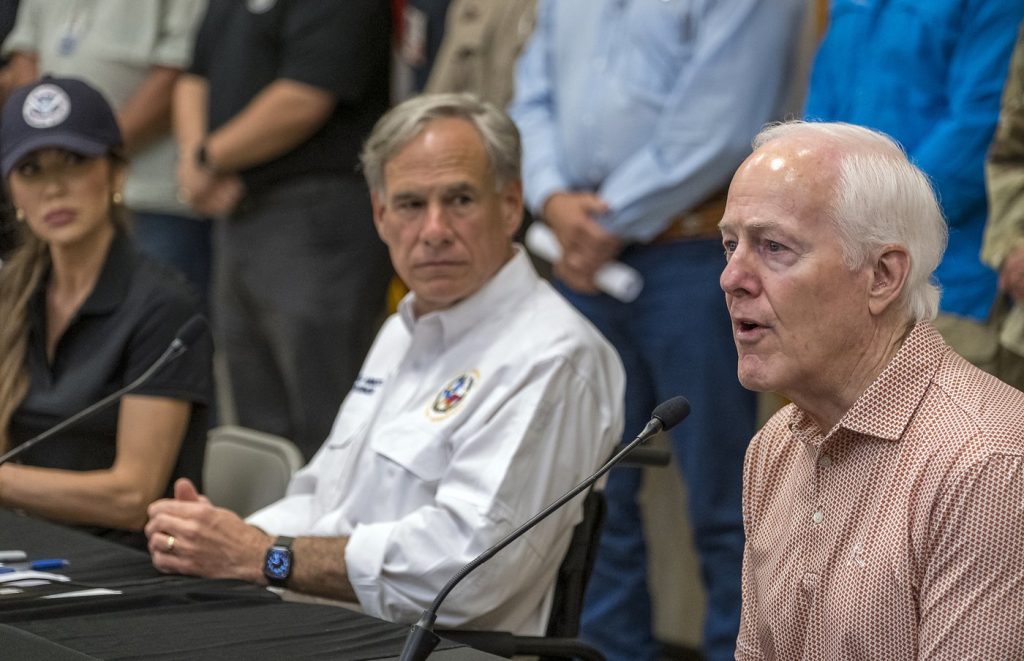WASHINGTON (AP) — Republicans are facing significant challenges in Senate races critical to retaining their majority in the upcoming midterm elections. Issues such as recruitment failures, open primaries, internal conflicts, and a lack of active leadership from President Donald Trump are complicating their efforts.
Despite these hurdles, Democrats are aware of their own challenging landscape. To regain the Senate majority, they need to secure a net gain of four seats. Most of the contested races in 2026 occur in states previously won decisively by Trump in November. Nevertheless, Democrats find potential openings in the difficulties confronting Republicans. The contentious GOP primary in Texas is particularly concerning for Republicans, as it threatens a long-held seat.
In Texas, a visible intra-party conflict surfaces, as state Attorney General Ken Paxton faces numerous personal and ethical allegations which could undermine his candidacy against incumbent Senator John Cornyn. National Republicans worry that Paxton, who boasts a stronger relationship with Trump, could jeopardize their chances in the general election. Paxton significantly outperformed Cornyn in fundraising during the second quarter, raising $2.9 million compared to Cornyn's $804,000, creating further tension within the party.
In North Carolina, the unexpected retirement of two-term Senator Thom Tillis has triggered an intense search for a suitable replacement in a state viewed as a key target by Democrats. Tillis's past confrontations with Trump regarding policies have left the door open for potential challengers, particularly Lara Trump, the president's daughter-in-law, who is contemplating a Senate bid. Her involvement could energize the GOP base, although her current residency in Florida raises questions about her commitment to run. Other GOP contenders may include RNC chair Michael Whatley and first-term Reps. Pat Harrigan and Brad Knott. Democrats are also eyeing former Governor Roy Cooper as a strong candidate should he choose to run.
In Georgia, the Republican Party is targeting the seat held by Democrat Jon Ossoff but lacks a well-known contender. Efforts to persuade popular term-limited Governor Brian Kemp to enter the race have so far failed, leaving the party in search of viable alternatives from a growing list of potential candidates which includes Reps. Buddy Carter, Mike Collins, and Derek Dooley, among others. Meanwhile, Ossoff is demonstrating solid fundraising prowess, having raised over $10 million in the last quarter alone.
Shifting focus to Michigan, Republicans are keen to capitalize on the retirement of Democratic Senator Gary Peters and the ensuing competitive primary among Democrats. Former Rep. Mike Rogers is gaining traction as a viable GOP candidate, but the party faces complications from Rep. Bill Huizenga, who is awaiting direction from Trump regarding his candidacy. On the other side, the Democrats are contending with a crowded primary, which may inadvertently benefit Republicans.
Finally, in Louisiana, Senator Bill Cassidy’s past vote to convict Trump creates turbulence within his party, leading to questions about whether Trump will choose to support or oppose him in the primaries. Despite facing a couple of challengers, Louisiana remains a predominantly Republican state, which Trump won by a significant margin. Democrats are hoping for a strong challenger, potentially former Governor John Bel Edwards, who has historically drawn support from Republicans. Republicans are also contemplating a run by Rep. Julia Letlow, following discussions between Trump and Louisiana Governor Jeff Landry.











